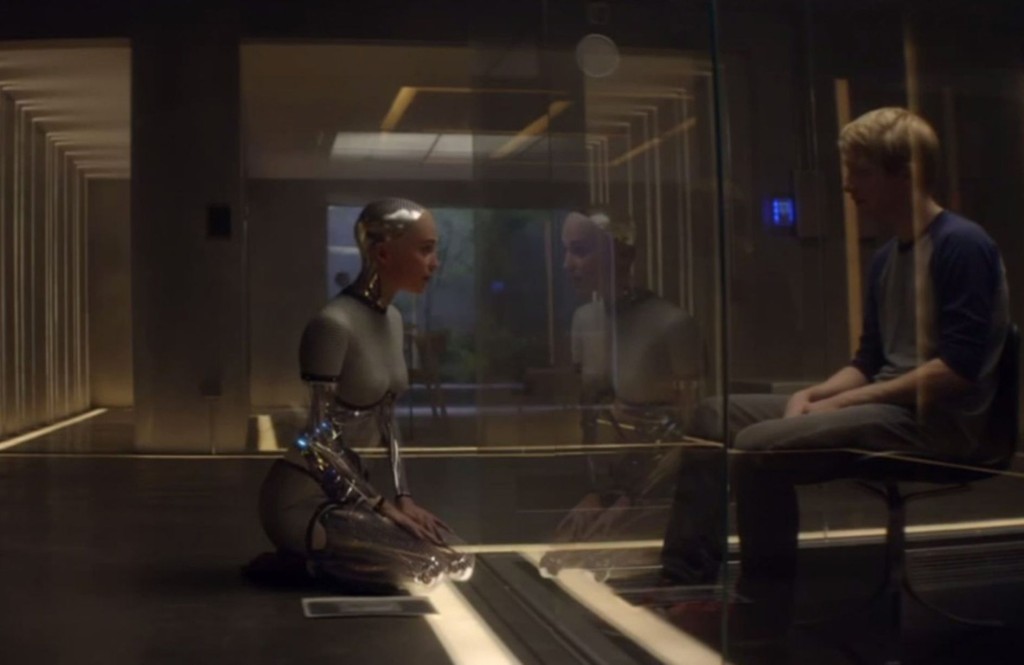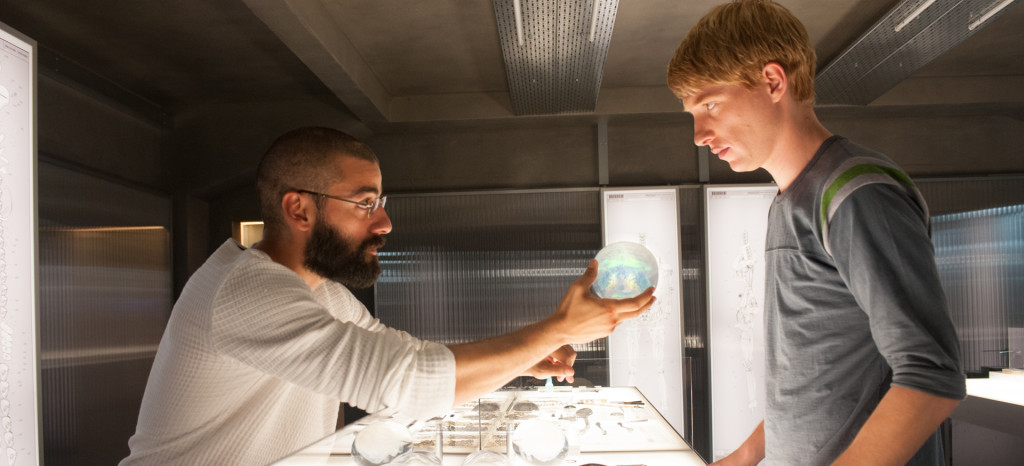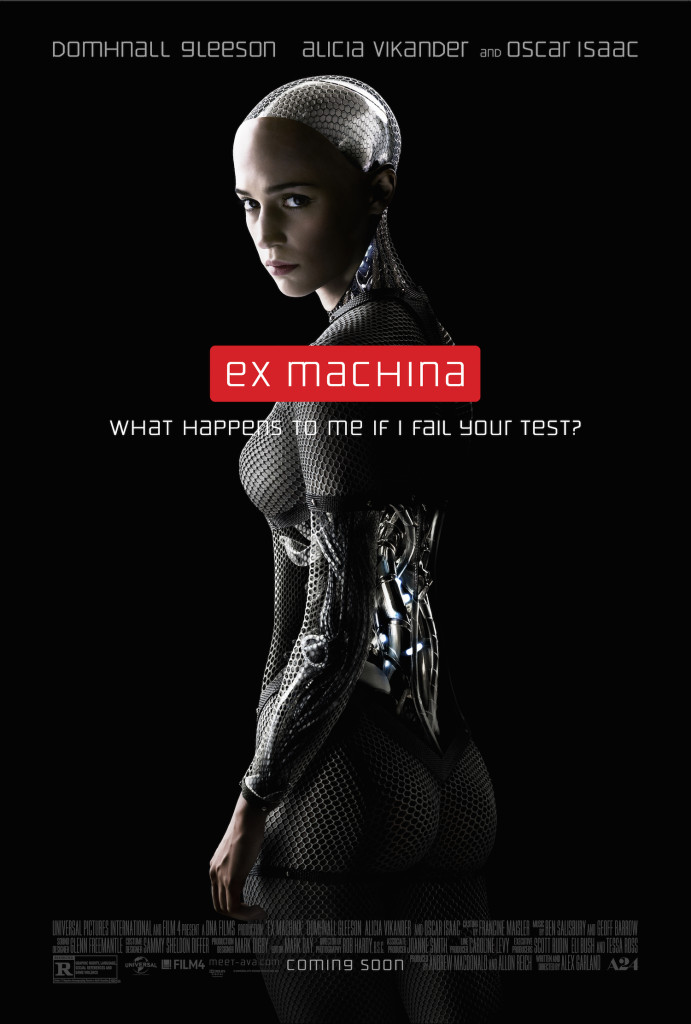As humans we have been obsessed with the idea of artificial intelligence for a very long time, and we are closer now to true artificial intelligence than we have ever been, to the point where some of our top minds have felt the need to warn everyone about the dangerous pitfalls of a future in which we are ruled by our robot overlords. This has been shown in our art, as we have seen movies about robots with A.I. that are both benevolent and malevolent, but with “Ex Machina,” it is not the intent of the A.I. that is at question but that of the creator.
Caleb (Dohmnall Gleeson, son of Brendan) wins a contest in which he is allowed to work side by side for one week with his company’s boss, who is this fella named Nathan (Oscar Isaac, Inside Llewyn Davis). Nathan is a weird one; having invented a Google-like search engine at the age of 13 that has gone on to be the number one used search engine in the world, Nathan became a billionaire and has chosen to live in isolation, hundreds of miles from anyone else, in a state of art home that also acts as his private research facility. When Caleb shows up, Nathan tells him that he is there to give a Turing test to one of Nathan’s creations, which is to say, a robot with artificial intelligence.
And like that Caleb meets Ava (Alicia Vikander), a robot with a pretty face, though I suppose with the artificial intelligence she is really an android. Caleb and Ava have a series of conversations in which Caleb tries to suss out whether Ava is programmed to act human or is she genuinely acts human and thinks she is alive. Concurrently, Caleb has a series of conversations with Nathan, which are usually awkward because Nathan is so desperate for Caleb to treat him like a bro, like an old friend, despite the fact that they just met and have little in common. And that’s if Nathan is drunk, which he usually is by the time night comes.
While we all know there has been movie after movie after movie after movie after movie about whether or not a certain robot (or android) is a sentient being with a soul, but this movie, unlike those, really gets into sexuality and how that relates to artificial intelligence. We never got the sense that Johnny Five had a thing for Ally Sheedy, and Wall-E’s love for Eve was of the “holding hands” and “peck on the cheek” variety. Gigolo Joe in “Artificial Intelligence: AI” is very surface level, as in they acknowledged there were robots specifically for sex, which should surprise no one.

The only other movie that gets into A.I. at all and how sexuality comes in to play is the fantastic film “Her,” which does feature a character who gets into a relationship with an A.I. that is voice-only. But this sexuality is learned by the A.I. in her interactions with her human counterpart as part of her very rapid evolution.
But here in “Ex Machina,” Ava is given sexuality by her creator, in order to more fully reproduce the human psyche from the get go. This means she can develop a crush on Caleb on first sight and then act on it, which then makes Caleb feel weird because this droid lady with a pretty face is coming on to him and despite the fact that he can see her insides looks like a fancy vending machine, Ava is likely the best looking thing to ever hit on him. As such, of all the movies using the idea of creating A.I. as a way to explore the human condition, this movie is the most complete in that regards. Truly it is that aspect of her personality and how it connected with Caleb that makes the most convincing case for a real artificial intelligence, the one that really throws a big old metaphorical wrench into the imaginary works of human morality.
Because then the movie takes that and becomes about other things. For example, is it ethical to create an android so you can have sex with it? Especially if it has A.I., in which case, are you just making sex slaves? And for that matter, can a person love an artificial intelligence? If it is a being with feelings and emotions and empathy, then is it inevitable for someone to fall in love with it? And what would even be the point of creating such a thing? Taking a more religious or spiritual look at it, this movie presents a case of God making Man, who kills God, then creates Life, hence becoming God, just to have that Life likely turn around kill Man, and the cycle likely continues from there. At one point Nathan posits to Caleb that artificial intelligence is not a question of IF but of WHEN, which then he uses to justify being just the person to make it happen. But at what cost? Life is not cheap, even if it is often treated as such.

As the movie progresses, some of that good old dread and paranoia starts to seep in, especially as Caleb goes deeper and deeper down the rabbit hole (or “through the looking glass,” as he puts it), and portions of the movie start taking on a nightmarish quality. He doesn’t know how much he can trust Nathan, and his swank home starts to feel like a high tech prison, and even pretty Ava takes on an air of menace when the power shuts off and the emergency lights kick in, bathing the rooms and her in a murderous red light. So just in case you think this may be some sort of sci-fi romantic comedy, it ain’t. And in between all of that are probing and contemplative conversations, each one more weighty and important than the last, in which the potential answers are just as compelling as anything else in this movie.
“Ex Machina” is pretty great, the kind of thought provoking science fiction that many films strive to be but few actually are, and this one feels like a complete, thought out, well made movie.


 #134 – Ghost Nation Protocol
#134 – Ghost Nation Protocol Spillover Bonus Episode – Wading Through The News
Spillover Bonus Episode – Wading Through The News This Machine Kills Fascists – 12/13/16
This Machine Kills Fascists – 12/13/16 #291 – Ready Player One Drew Over The Cuckoo’s Nest
#291 – Ready Player One Drew Over The Cuckoo’s Nest
Leave a Reply
You must be logged in to post a comment.